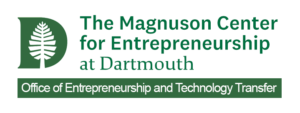One Dartmouth Fosters Environment For Entrepreneurship
Bringing people together across disciplines and experiences leads to new ways of thinking.

During a recent Dartmouth Entrepreneurs Forum Fireside Chat, Laura Rippy, managing partner of Green D Ventures, talked about what can make a start-up stand out. A lot of it comes down to the composition of the team.
“You’re stronger by having different perspectives coming together,” Rippy told the audience.
That’s one reason why the Dartmouth community is ripe for opportunities in entrepreneurship. The One Dartmouth approach, which brings people together across the five different schools on campus, allows students and faculty to work together across disciplines and departments.
“We’re not just collaborating with chemistry and biology and physics and computer science, but we’ve got active partnerships with studio art, with economics, with public policy and government to provide undergraduate students with the opportunity to shape their education,” says Provost Joseph Helble.
Entrepreneurial thinking hinges on the ability to spot a solution that others have overlooked. In most cases, that requires a new way of looking at a problem. Approaching an issue from multiple viewpoints, as Dartmouth students are taught to do throughout their studies, makes it more likely that you’ll see an answer that other people have missed.
Rippy credited her past success as CEO at Handango in the early 2000s to the diversity of her team. Not only did the team members bring their various backgrounds to bear on problems, but they also fundamentally approached processes in ways that were different from each other, building the strength of the team.
At one point, Motorola asked the team to look at a problem that the company had invested $19 million trying to solve.
“I called and said ‘I think we cracked it,’” Rippy recalled. “They were stunned.”
The team was able to solve the issue because of their unique diversity in terms of experience, expertise and brain mapping, Rippy believes.
The differences in ways of approaching a problem, which Rippy has identified as critical to success as an entrepreneur, is exactly what the One Dartmouth community aims to foster. Under the One Dartmouth umbrella, a biotech entrepreneur can work with a visual artist; an engineer can work with a sociologist; a chemist can work together with a computer scientist. By pairing their expertise, these innovators are left with a whole that is greater than the sum of its parts.
When this collaborative approach is paired with support for and education about the entrepreneurial process, like those available through The Magnuson Center, the spark is given fuel. With time, individual companies and innovators are creating a culture of entrepreneurship on campus that both strengthens and benefits from the One Dartmouth approach.

